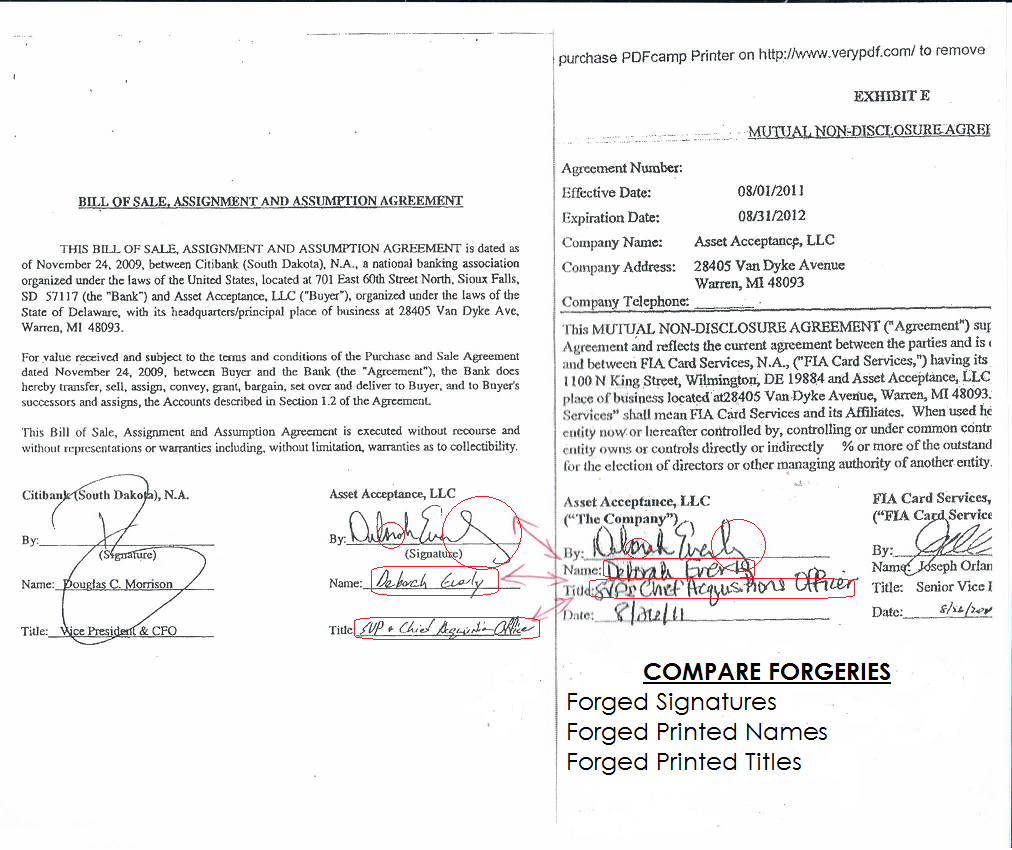Posted on 15 August 2016.
BRIAN and CYNTHIA POAG, Appellants,
v.
NATIONSTAR MORTGAGE, LLC, Appellee.
Case No. 1D15-2464.District Court of Appeal of Florida, First District.
Opinion filed August 11, 2016.An appeal from the Circuit Court for Duval County, A. C. Soud, Jr., Senior Judge.
Thomas R. Pycraft, Jr., John J. Spence, David D. Naples, Jr., and Michael J. Pelkowski of Pycraft Law LLC, St. Augustine for Appellants.
Nancy M. Wallace of Akerman, LLP, Tallahassee, William P. Heller of Akerman, LLP, Fort Lauderdale, and Eric M. Levine of Akerman, LLP, West Palm Beach, for Appellee.
PER CURIAM.
Brian and Cynthia Poag appeal a final judgment reestablishing a lost note in favor of Nationstar Mortgage, LLC. The Poags argue that Nationstar failed to prove reestablishment of the lost note under section 673.3091, Florida Statutes (2014). Because the evidence was insufficient to support reestablishment of the lost note, we reverse the final judgment.
The Poags executed a promissory note on October 14, 2005, in favor of Nationstar. On September 18, 2012, Nationstar filed a complaint to reestablish a lost note under section 673.3091, Florida Statutes, and for foreclosure on the mortgage securing that lost note. Nationstar alleged that the Poags defaulted on the loan by failing to make the June 15, 2009 payment, as well as all subsequent payments. Nationstar alleged that it was in possession of the lost note and entitled to enforce it when the loss of possession occurred. A copy of the note (reflecting a blank endorsement) was attached to the complaint. Prior to trial, Nationstar was served with a request for admissions, which requested Nationstar to admit the following:
1. Admit that [Nationstar] was not in physical possession of the original Note endorsed in blank on the date of the inception of this lawsuit.
2. Admit that the last entity in physical possession of the original Note was the Law Office of Marshall C. Watson, P.A.
3. Admit that Nationstar Mortgage, LLC was not in physical possession of the original Note when the loss of the possession of Note occurred.
4. Admit that [Nationstar] was not the “owner” of the subject Note on the date loss of the Note. . . .
5. Admit that [Nationstar] is not the owner of the Note.
6. Admit that [Nationstar] did not send [the Poags] a letter in compliance with Paragraph 22 of the Mortgage prior to the inception of this lawsuit.
Nationstar failed to timely respond to the request for admissions. The foregoing requests were technically admitted pursuant to Florida Rule of Civil Procedure 1.370(a), which provides that matters are admitted unless the party serves a written answer or objection within thirty days of service to the party requesting the admission. Fla. R. Civ. P. 1.370(a). Subdivision (b) outlines the effect of an admission under this rule, stating that the admission “is conclusively established unless the court on motion permits withdrawal or amendment of the admission.” Fla. R. Civ. P. 1.370(b). Although Nationstar sought relief from the admissions at the end of the bench trial through an ore tenus motion, the trial court denied relief, conclusively establishing the admissions.[*]
“A finding that a lost note is reestablished, under section 673.3091, Florida Statutes, is reversible upon the appellate court’s determination of a failure of proof.” Seidler v. Wells Fargo Bank, N.A., 179 So. 3d 416, 417 (Fla. 1st DCA 2015) (citing Correa v. U.S. Bank, N.A., 118 So. 3d 952 (Fla. 2d DCA 2013)). In order to prove a claim to reestablish a lost note, the party seeking reestablishment must meet the requirements under section 673.3091. See Blitch v. Freedmon Mortg. Corp., 185 So. 3d 645, 645-46 (Fla. 2d DCA 2016) (quoting § 673.3091, Fla. Stat. (2014)); see Correa, 118 So. 3d at 955 (“For the requirements to reestablish a lost note we look to section 673.3091, Florida Statutes (2007).”). Section 673.3091 provides the requirements for entitlement to enforce a lost note as follows:
(1) A person not in possession of an instrument is entitled to enforce the instrument if: (a) The person seeking to enforce the instrument was entitled to enforce the instrument when loss of possession occurred, or has directly or indirectly acquired ownership of the instrument from a person who was entitled to enforce the instrument when loss of possession occurred; (b) The loss of possession was not the result of a transfer by the person or a lawful seizure; and (c) The person cannot reasonably obtain possession of the instrument because the instrument was destroyed, its whereabouts cannot be determined, or it is in the wrongful possession of an unknown person or a person that cannot be found or is not amendable to service of process.
§ 673.3091(1), Fla. Stat. (2014). Under the first requirement of section 673.3091(1), Nationstar had to prove that it was entitled to enforce the note when loss of possession occurred. Section 673.3011, Florida Statutes (2014), defines a person entitled to enforce an instrument as “(1) The holder of the instrument; (2) A nonholder in possession of the instrument who has the rights of a holder; or (3) A person not in possession of the instrument who is entitled to enforce the instrument pursuant to s. 673.3091 or s. 673.4181(4).” § 673.3011, Fla. Stat. (2014).
Because the conclusively established admissions foreclose the ability to prove Nationstar was the bearer, holder, or possessor of the note in question, the trial court erred in finding that the evidence was sufficient to support reestablishment of the lost note. As such, the final judgment reestablishing the lost note is reversed and remanded for judgment in favor of Appellants.
WETHERELL and WINOKUR, JJ., CONCUR; MAKAR, J., CONCURS WITH OPINION.
MAKAR, J. concurring.
Nationstar Mortgage sought to do two separate things in the proceedings below: (a) reestablish a lost note and (b) enforce the note once reestablished. The trial court reestablished the lost note but refused to enforce it because Nationstar’s failure to respond to requests for admissions—now deemed admitted—foreclosed the bank’s ability to seek enforcement.
The trial court correctly denied enforcement of the note, but erred in reestablishing the note under section 673.3091, Florida Statutes (2014), which is limited to the “[e]nforcement of lost, destroyed, or stolen instrument[s].” (Emphasis added). Reestablishment and enforcement are not the same. Section 673.3091, which has more difficult enforcement standards, does not itself set forth reestablishment standards for a lost note. Instead, section 71.011, Florida Statutes (2014), entitled “Reestablishment of papers, records, and files,” contains the general standards for doing so. The problem is that Nationstar did not rely on section 71.011 in the trial court proceedings and raised the statute for the first time on appeal. For this reason, and because no fundamental error is shown, vacating the reestablishment of the note is proper.
The question of whether section 673.3091 displaces section 71.011 as to the standards for reestablishing a note is a debatable one. At least one court views it as having this effect. See Mason v. Rubin, 727 So. 2d 283, 284 (Fla. 4th DCA 1999) (stating that “[e]stablishing a lost negotiable instrument is governed by . . . section 673.3091 . . . [which] contains more stringent requirements than [section 71.011].”) (emphasis added). The contrary argument is that a note can be reestablished under the plain language of section 71.011, but that its enforcement is governed by section 673.3091. This issue cannot be resolved given the lack of preservation of the issue in this case (and the absence of fundamental error), but ought to be addressed in a future case to provide clear guidance to trial courts.
NOT FINAL UNTIL TIME EXPIRES TO FILE MOTION FOR REHEARING AND DISPOSITION THEREOF IF FILED.
[*] Nationstar has not cross-appealed the trial court’s denial of its motion for relief from technical admissions.
© 2010-19 FORECLOSURE FRAUD | by DinSFLA. All rights reserved.





























Recent Comments